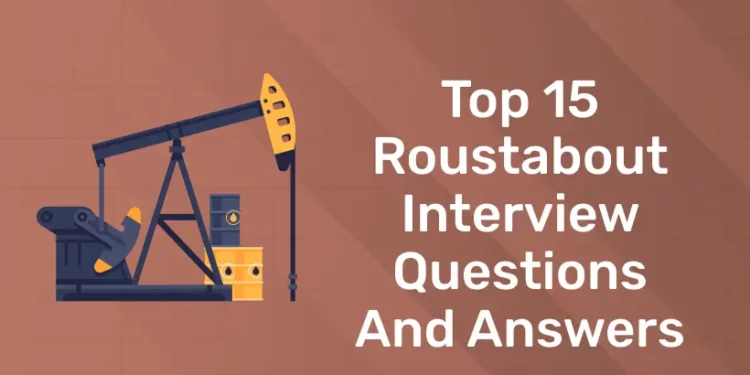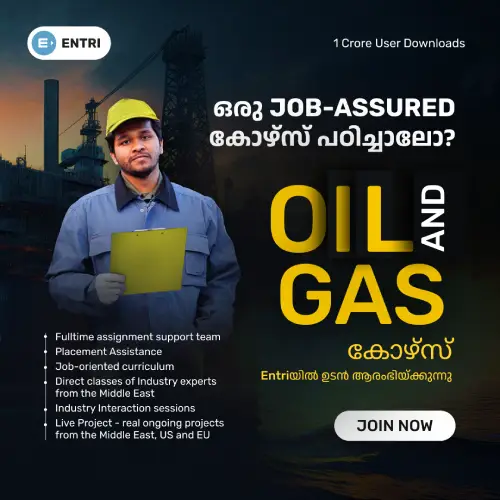Table of Contents
To increase your chances of landing the job, it’s critical to prepare for an interview. You can provide more insightful responses at the interview by researching the questions ahead of time. The majority of interviews will involve inquiries regarding your qualifications, experience, personality, and suitability for the position. This article goes over sample responses to some of the most typical roustabout interview questions as well as samples of other interview topics.
Get Certified! Get Confident! Join our Oil and Gas Course!
Introduction
Among the people who work on oil drilling crews are rogues. Their main responsibilities include plumbing assembly, disassembly, monitoring, and repair.to maintain the drilling area’s functionality. usually spent two or three weeks on a drilling rig or platform, with another two or three weeks of onshore recuperation.
You should be highly skilled with mechanics, capable of keeping an eye on things to make sure everyone is safe, and intelligent. You usually learn on the job, thus prior to starting employment, you do not need to have any official schooling or training.
Top 15 Roustabout Interview Questions and Answers
Interview preparation is necessary to land a roustabout position in the oil and gas sector. We’ve put together a list of the best 15 roustabout interview questions and carefully written responses to assist you succeed.
Q1. Do you feel comfortable working outdoors in all kinds of weather?
This may be a test question to see how well you can adapt to the challenges of an oil field job. Please be honest in your response and explain how you would handle working in all weather conditions, including extreme cold or heat.
Sample Answer:
Obviously! I’ve done a lot of outside work in a variety of weather situations. As a Roustabout in my current role, I’ve worked in the rain, snow, and extreme heat. I also make care to dress appropriately for the weather so that I can work comfortably and efficiently. I’m confident in my abilities to complete the assignment swiftly and effectively regardless of the weather.
Q2. What roustabout qualities do you like and dislike the most?
By asking you this question, the interviewer can learn a great deal about your personality and how you feel about working in your industry. To show the hiring manager that you are passionate about this field of work, it is important to emphasise the benefits of being a roustabout in addition to being accurate in your response.
Sample Answer:
My favourite aspect of being a roustabout is working outside and being a member of a team. I enjoy learning new skills, working with a variety of materials, and using my hands to solve issues. Although operating an oil rig might be physically demanding, the benefits of your efforts are great.
Q3. If someone was not familiar with the field, how would you describe roustabout work to them?
By responding to this question, you may determine how well you can sum up what you do in plain English. It also allows the interviewer know whether you have any unique or intriguing ways to discuss your work. Try to be as clear and concise as you can in your response while yet being interesting.
Sample Answer:
An oilfield worker known as a roustabout performs a variety of tasks related to maintaining and operating an oil or gas well. The work involves a lot of manual labour, including operating heavy machines and mending broken equipment. It’s also essential to be knowledgeable about safety regulations and protocols to ensure that all tasks are carried out both safely and properly.
Roustabouts are responsible for the upkeep and inspection of production facilities, pipelines, and other equipment used in the oil and gas industry. They must be able to recognise these problems and take appropriate action when necessary. They can also be required to assist with the installation of new equipment and regular maintenance inspections.
Q4. How much huge machinery handling experience do you have?
Oftentimes, roustabouts have to operate big machinery like cranes and forklifts. Employers ask you this question to see if you have the experience required to do your job well. In your response, describe the types of machinery you have operated in the past. What amount of familiarity with each kind do you have?
Sample Answer:
I possess a great deal of experience managing heavy equipment in the oil and gas industry. Over the course of my more than five years as a Roustabout, I have worked a variety of machinery, including cranes, forklifts, and bulldozers. I am familiar with the regulations and safety protocols that apply to this type of equipment.
In addition to my job experience, I hold certifications from the National Centre for Construction Education and Research (NCCER), which attests to my competence and comprehension of operating heavy gear. I hold certifications for operating cranes, forklifts, and bulldozing equipment.
Q5. Tell about an instance where you had to troubleshoot a piece of machinery.
Roustabouts often need to be able to identify and resolve equipment problems. Employers use this question to determine whether you possess the skills necessary to carry out your work correctly. In your response, outline the steps you took to resolve the issue.
Sample Answer:
I recently had to debug a piece of equipment at my current job. The issue was that I had to figure out why the pressure gauge on one of our pumps wasn’t reading correctly. I looked over the pump and saw that several connections weren’t tightened, so I adjusted them and tested the pressure again. Given that it read correctly this time, I knew it was the cause of the problem.
Q6. Which three tools, if you could only have one for a roustabout job, would you pick?
This is an assessment of your roustabout expertise and understanding. While a routabout needs to be skilled with a variety of tools, the interviewer is more interested in finding out the ones you are most comfortable with. Your response should contain three things that you feel comfortable using in any situation.
Sample Answers:
- Three tools would be all I would need to do my work as a roustabout: a pipe wrench, a hammer, and a wrench set.
- Any roustabout needs a wrench set since it makes it possible to work on different kinds of gear and equipment swiftly and effectively. Additionally, it aids in ensuring that all of the bolts and nuts are correctly tightened. Lastly, a pipe wrench is a vital tool for any roustabout because it makes it simple to grasp and turn pipes to ensure proper installation.
Q7. How would you react if you noticed a safety hazard while working on an oil rig?
If you truly care about the safety of both yourself and your coworkers, employers want to know. They want your word that you will notify them as soon as there are any hazards or violations. Give an example of a prior instance in which you reported a hazard to demonstrate how you would respond to the current situation.
Sample Answer:
If I observed a safety hazard while working on an oil rig, my first priority would be to ensure the safety of everyone nearby. I would immediately report the issue to my supervisor and any other staff members who require notification. After that, I would assess the situation and take the required steps to make things right.
Q8. How well-versed in teamwork are you?
You will need to work in tandem with other crew members as a roustabout. Employers use this question to assess your interpersonal and communication skills. Make use of your response to show that you appreciate working in a team and that you are eager to help those in need.
Sample Answers:
Any job’s success, in my opinion, depend on its capacity for teamwork. I have extensive experience working in teams, therefore I am aware of how crucial it is to cooperate, communicate, and work as a team. I can follow directions both well while providing them and when receiving them. In tackling problems, I like to use unique and innovative thinking. I also enjoy brainstorming with the team and helping them to accomplish their goals.
Q9. Have you ever worked on an oil rig before?
This is a useful question for the interviewer to find out if your experience and the work you would be doing are similar. In your answer, highlight any unique skills or experience that make you an excellent fit for the position.
Sample Answer:
Yes, I am quite skilled in maintaining oil rigs. I have been a Roustabout for the past five years, and during that time I have learned a great deal about every aspect of rig maintenance. I’m certain that I can perform any task that is thrown at me, including inspecting and maintaining equipment and ensuring that safety protocols are followed.
I take satisfaction in making sure that every activity is carried out safely and accurately because I understand how crucial it is to maintain an oil rig’s seamless operation. Furthermore, I know how different components work effectively together, which makes it easier for me to recognise problems and quickly identify fixes.
Q10. When is it appropriate to fix something on an oil rig by hiring a repairman?
This is a possible question used in an interview to gauge your capacity to solve problems and collaborate with others. When you called a repairman or other professional for assistance on an oil rig, use instances from previous encounters.
Sample Answers:
Safety is always the first concern when it comes to oil rigs. As a Roustabout, I am aware that prompt and effective repairs are necessary to guarantee that all machinery is operating as intended. Thus, I would assess the problem before determining whether or not to call a repairman. I would try to resolve the problem on my own if it seems like it can be resolved with little work.
However, I would get in touch with a repairman right away if the issue calls for certain skills or equipment. Furthermore, I would contact for expert assistance right away if there was an incident on the rig, like a fire or gas leak. My ultimate goal is to make sure that all of the equipment is operating properly and to keep everyone safe.
Q11. How do you distinguish yourself from other roustabouts?
Employers enquire about your talents and abilities using this inquiry. What sets you apart from the other prospects is what they want to know. Consider a trait or ability that makes you stand out from the crowd when you respond. Additionally, you can list any certificates you possess.
Sample Answers:
I think my background and credentials set me apart from other roustabouts. And I have been a Roustabout for the last five years, therefore I am familiar with every facet of the position. I have extensive knowledge of safety procedures, and I make sure that any assignment I’m given is finished in compliance with industry standards. I also have a lot of experience doing maintenance and repairs, which has helped me to hone my problem-solving abilities.
Q12. How do you envision the oil sector developing in the future?
This could be a question the interviewer uses to gauge your knowledge about the future of the industry and how it might impact their business. In your response, demonstrate your knowledge of current oil industry trends and your ability to apply them to the circumstances faced by your prospective employer.’
Sample Answers:
I think the oil business has a bright future. Our efficiency has increased and we can access more resources thanks to technological advancements. This implies that since oil is an essential resource for numerous businesses, the demand for it will continue to be high. I’m sure that my background and expertise will be able to contribute to the effective and safe execution of operations.
Q13. How frequently should oil rig maintenance be done?
An essential component of operating on an oil rig is maintenance. Employers enquire about your understanding of the value of maintenance and the frequency of its execution by asking you this inquiry. Give an explanation of why routine maintenance is necessary to maintain oil rigs operating efficiently in your response. Describe how you would do maintenance after every ten days of work, or at least once a month.
Sample Answers:
I think there should be a few parameters that influence how frequently maintenance is performed on oil rigs. First and foremost, the age and state of the rig should be considered; if it is relatively new or in good condition, then fewer maintenance sessions can be required. Lastly, it’s important to evaluate the kind of work being done on the rig; some jobs could need maintenance more frequently than others.
Q14. What objectives do you have for the role?
The interviewer wants to know if the Roustabout is interested in a long-term career with the organisation or just a temporary post. The organisation will want to invest in training and skill development, therefore it is crucial to know if the Roustabout is looking for a long-term employment.
Sample Answer:
As the Roustabout, my objective is to help the drilling team and make sure that everything is operating as it should. In addition, I am in charge of keeping all of the equipment in good operating order and maintaining it on the job site. I take great satisfaction in making sure that every operation is completed safely and effectively since I am committed to my work.
Q15. How much experience do you have with large machinery?
Given that operating heavy machinery is a crucial aspect of the profession, an interviewer would inquire of a/an Roustabout, “What is your experience with heavy machinery?” Heavy machinery is used by rondabouts to transport supplies and equipment throughout the job site. They have to be competent and safe operators of the equipment.
Sample Answers:
I have experience driving large vehicles like loaders, bulldozers, and excavators. I am knowledgeable about the protocols and safety measures related to this kind of work. Working long hours in demanding settings is something I am also at ease with.
Get Certified! Get Confident! Join our Oil and Gas Course!
Roustabout Interview Sample Questions and Answers
Q. What are Roustabout’s main responsibilities?
Example:
Typically, routabouts are employed by oil corporations. The U.S. Bureau of Labour Statistics states that roustabouts maintain clean and organised work environments and clean tools, equipment, and pumps. Roustabouts also load, unload, and stack items and equipment using truck winches and motorised lifts to remove loose pipe and debris. In addition, they transport supplies and machinery to the job site, assemble, maintain, and disassemble machinery and equipment, such as boilers, pipes, and engine parts.
Q. What tasks does a Roustabout perform?
Answer:
- The drilling deck and its accessories are cleaned, scraped, and painted.
- Supplies are offloaded and placed in storage rooms.
- transports tools and supplies to the job location.
- loads and stacks equipment using lifting apparatus.
- aids in equipment repair.
- helps in the chemical mixing process.
Q. What Do the Secondary Tasks of a Roustabout?
Answer:
Working alongside crane and gin-pole truck operators is another duty expected of roustabouts. Operators are guided by rondabouts, who also fasten lifting slings to the loads. Additionally, they combine drilling mud, which is used to lubricate the drill bit as it penetrates the earth. When working on offshore oil rigs, routabouts are also required to maintain the vessel, which includes cleaning, scraping, and painting the deck, tools, and work areas.
Q. What Tools Are Needed for a Roustabout?
Answer:
Hard helmets, safety gloves, goggles, earmuffs, and boots are worn by rogues. O-Net Online states that they employ a variety of handheld and power tools, including saws, electric sanders, hammers, safety hooks, safety belts and harnesses, hoists, oxygen gas analyzers, power grinders, screwdrivers and hammers. In order to write reports, track maintenance tasks, and manage projects, they also need the usage of computer software.
Q. What are the tasks associated with roustabout drill operations?
Answer:
Roustabouts help other crew members with drill operations when asked. They also carry out examinations. As per roustabouts inspect flow pipes and visually spot leaks with the use of electronic detectors. In order to prevent contaminating the soil and water, they clean up spilled oil and tighten and fix pipes to fix leaks. In order to prevent oil from spilling freely during a significant disaster, roustabouts also excavate drainage ditches around wells and storage tanks.
Conclusion
A thorough preparation of possible interview questions and confident, well-spoken answers are necessary for a successful outcome. Your chances of success will increase if you are prepared with sample interview questions and practise your responses. This will allow you to highlight your skills, experience, and excitement for the position. With these professional tips at your disposal, you’ll be ready to make an impression on prospective employers and land a job as a roustabout in the oil and gas sector.










